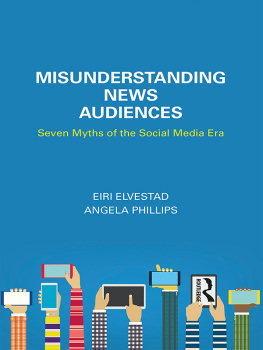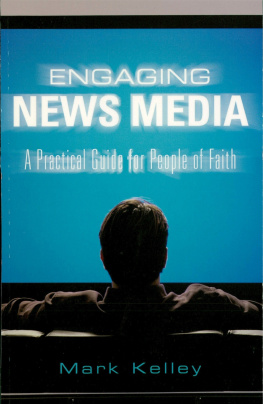ROUTLEDGE LIBRARY EDITIONS: TELEVISION
Volume 6
TELEVISION NEWS AND THE ELDERLY
TELEVISION NEWS AND THE ELDERLY
Broadcast Managers' Attitudes Toward Older Adults
MICHAEL L. HILT
First published 1997
This edition first published in 2013
by Routledge
2 Park Square, Milton Park, Abingdon, Oxon, OX14 4RN
Simultaneously published in the USA and Canada
by Routledge
711 Third Avenue, New York, NY 10017
Routledge is an imprint of the Taylor & Francis Group, an informa business
1997 Michael L. Hilt
All rights reserved. No part of this book may be reprinted or reproduced or utilised in any form or by any electronic, mechanical, or other means, now known or hereafter invented, including photocopying and recording, or in any information storage or retrieval system, without permission in writing from the publishers.
Trademark notice: Product or corporate names may be trademarks or registered trademarks, and are used only for identification and explanation without intent to infringe.
British Library Cataloguing in Publication Data
A catalogue record for this book is available from the British Library
ISBN: 978-0-415-82199-5 (set)
eISBN: 978-0-203-51517-4 (Set)
ISBN: 978-0-415-83713-2 (Volume 6)
eISBN: 978-0-203-40223-8 (Volume 6)
Publisher's Note
The publisher has gone to great lengths to ensure the quality of this reprint but
points out that some imperfections in the original copies may be apparent.
Disclaimer
The publisher has made every effort to trace copyright holders and would
welcome correspondence from those they have been unable to trace.
TELEVISION NEWS AND THE ELDERLY
BROADCAST MANAGERS' ATTITUDES TOWARD OLDER ADULTS
MICHAEL L. HILT
GARLAND PUBLISHING, INC.
NEW YORK & LONDON / 1997
Copyright 1997 Michael L. Hilt
All rights reserved
Library of Congress Cataloging-in-Publication Data
Hilt, Michael L., 1959-
Television news and the elderly : broadcast managers'
attitudes toward older adults / Michael L. Hilt.
p. cm. (Garland studies on the elderly in America)
Includes bibliographical references and index.
ISBN 0-8153-2627-0 (alk. paper)
1. Television broadcasting of newsUnited States.
2. Television and the agedUnited States. 3. Aged in television
United States. 4. AgeismUnited States. I. Title. II. Series.
PN4888.T4H55 1997
070.1950846dc20 96-36711
Printed on acid-free, 250-year-life paper
Manufactured in the United States of America
To my family for its love and support
Contents
Tables
In her most recent book, The Fountain of Age, author Betty Friedan addresses the problem of ageism in American society. Perhaps it is indicative of the scope and the timeliness of this issue that the mother of the women's movement in the United States has now turned her attention to equal treatment for older people. An active 75-year-old, Ms. Friedan has criticized the societal forces that would shuttle her, and her contemporaries, off to the rocking chair. It is through such efforts that public debate and changes in social consciousness emerge.
Social consciousness changes in our society, but it does not change at a steady pace. With recent legal decisions questioning the constitutionality of affirmative action, some might argue that the civil rights movement that emerged in the late 1950s and early 1960s has experienced a step backward in its course of progress. On the other hand, to view the achievements that have been made in this arena, one need only look back over major news events of the past several decades.
The recent death of Carl Stokes, first black mayor of a major American city, may be seen as something of a milepost in the progress of race awareness. One need only contrast the treatment given to early steps toward racial equality in the public press and in the electronic media, which could honestly be characterized as cautious (or not too cautious) alarm, to the fairly mundane reporting that is seen now on a day-to-day basis. An example is the financial crisis the NAACP has found itself in during the past two years. This certainly would have garnered headlines and features stories two or three decades ago; now it is just another news item. Perhaps this is a sign of the acceptance of civil rights organizations into the American mainstream. Their problems are now simply accepted; they're no big deal. The Million Man March on Washington D.C. received considerable attention in the press, but nothing like the attention it would have received had it taken place in, say, 1965 rather than 1995. The passing of Carl Stokes is indicative; one would now be hard pressed to name all the black mayors of major American cities. Thus we can measure progress in the realm of civil rights and changes in public attitudes. In a similar way we might note progress in the women's movement: events and issues that were major controversies a decade or two ago are now taken pretty much in stride.
Such is not the case for public consciousness of ageism. Racist and sexist jokes are out of bounds in terms of political correctness. Bons mots at the expense of the elderly are acceptable. Few personnel managers are unaware of the legal minefields represented by racial or sexual discrimination; age discrimination on the job is still an everyday matter. Everyone knows that corporate downsizing means firing the old guys who've worked their way to the top of the pay scale. Pronouncements from aging organizations are seen as controversial rather than just a matter of current debate. Public outcries for generational equity arise from the basic supposition that the elderly are getting a larger piece of the public pie than to which they are entitled.
In the arena of public debate, a large part of which is represented on the electronic broadcast media, older people are alternately patronized, ignored, or feared. News accounts of Jeanne Calment's recent birthday, which purportedly makes her the longest-lived human, were rife with stereotypical phrases. Little change has been seen since the 1970s, when it was an annual event for the reporters to troop out to the home of Charlie Smith in Bartow County, Florida, to ask him to what he attributed his great age. In Mr. Smith's case, the actual reason for his remarkable longevity was lying, he was really 103, not 137, when he died in 1979 (Freeman, 1982). Reporters snigger that Jeanne Calment takes a cigarette and a glass of brandy now and again. Indeed, the stories written about Charlie Smith seemingly could be used for Jeanne Calment, altered to insert a birth date of 1875 and a different name and place of birth. Perhaps the cuteness of these accounts will some day be seen with the same sense of impropriety vis a vis great age that we now view the Rastus in the watermelon patch racial humor of the 1930s.
Johnny Carson's popular Aunt Blabby character, a partially-senile battle-axe who'd occasionally take a belt of whiskey from the flask concealed in her walking cane, was quietly retired long before Carson's own retirement a few years ago. This was in response to protests from the Gray Panthers, an advocacy group of older people. Similarly, the muppet Professor Arid, a college teacher so old and boring that he was actually put to sleep by his own lectures, disappeared from









